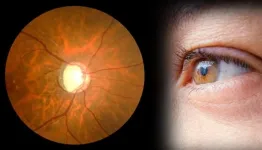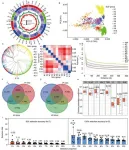(Press-News.org) AURORA, Colo. (Jan. 2, 2025) - Researchers at the University of Colorado Anschutz Medical Campus have discovered that some CAR-T cells engineered to fight cancer and other conditions carry the memory of past encounters with bacteria, viruses and other antigens within them, a finding that may allow scientists to manufacture the cells in more precise and targeted ways.
The study, published today in the journal Nature Immunology, focused on chimeric antigen receptor (CAR)-T cells, an effective therapy against cancer, especially leukemia and lymphoma. T cells, a kind of immune cell, are removed from the patient’s blood, then modified to target cancer and infused back into the patient.
Now researchers have discovered that some of these cells have long, durable memories. They found that even after an extensive manufacturing process to insert the CAR into the cells, CAR-T cells that had past contact with antigens behave differently than those that have never encountered an antigen.
“Unlike most drugs, CAR-T cell products are not uniform. We know that variability exists but the nature of that variability is only beginning to be understood,” said the study’s senior author Terry Fry, MD, professor of pediatrics, oncology and hematology at the University of Colorado School of Medicine and executive director of the Gates Institute at CU Anschutz which manufactures CAR-T cells. “The thing that was surprising here was the extent to which past interactions with antigens were durably imprinted on the cells.”
Fry and the study’s lead author Kole DeGolier, PhD, an immunology researcher at CU Anschutz, found that `memory cells,’ those with prior antigen experience, killed cancer cells quickly but became exhausted sooner and reproduced slowly, opening the door to a potential relapse.
At the same time, they discovered favorable disease-fighting capabilities such as robust expansion and resistance to exhaustion of ‘naïve’ cells, those with no antigen experience. A direct comparison of the two cell types allowed the researchers to identify specific gene targets to modulate and improve function. They found that naïve cells specifically could be boosted by targeting genes like RUNX2. The cells also lived longer and reproduced more quickly than memory cells.
“These epigenetic differences can be used to identify genes that can be manipulated to modify function,” DeGolier said.
The study was first done with mouse models, then in human cells. T cells were taken from vaccinated and unvaccinated subjects. The cells from the vaccinated models changed after encountering vaccine antigens in the lymph nodes. They later responded swiftly and effectively against leukemia cells due to the `memory’ of being previously exposed to an antigen. Yet they exhausted themselves faster than naïve cells.
While naïve T cells lacked the disease-fighting imprinting of memory cells, they became more effective when RUNX2 was added. They also lived longer and the gene protected them against exhaustion, allowing them to keep fighting cancer.
“There was this balance dictated by the prior history of the cell. If you added RUNX2 to a naïve cell you could make it kill cancer a little bit better,” Fry said. “Our studies also generated a large data set of other proteins that we can explore along with RUNX2.”
The findings could lead to more precise engineering of CAR-T cells, allowing them to attack cancer more effectively while potentially alleviating some of the side-effects of the therapy which can include a strong inflammatory response.
“Understanding these differences can guide the development of approaches to rationally manipulate specific cellular attributes,” the authors wrote. “RUNX2 effects in limiting exhaustion programs should also be explored further, especially in solid tumor contexts, where exhaustion plays a large part in limiting anti-tumor T cell responses.”
About the University of Colorado Anschutz Medical Campus
The University of Colorado Anschutz Medical Campus is a world-class medical destination at the forefront of transformative science, medicine, education and patient care. The campus encompasses the University of Colorado health professional schools, more than 60 centers and institutes, and two nationally ranked independent hospitals - UCHealth University of Colorado Hospital and Children's Hospital Colorado - that treat more than two million adult and pediatric patients each year. Innovative, interconnected and highly collaborative, the University of Colorado Anschutz Medical Campus delivers life-changing treatments, patient care and professional training and conducts world-renowned research fueled by over $705 million in research grants. For more information, visit www.cuanschutz.edu.
END
CAR-T cells hold memories of past encounters
CU Anschutz scientists find `memory cells’ more effective at killing cancer but they become exhausted faster. Certain proteins may offer a remedy
2025-01-02
ELSE PRESS RELEASES FROM THIS DATE:
Quantity over quality? Different bees are attracted to different floral traits
2025-01-02
UNIVERSITY PARK, Pa. — When it comes to deciding where they’re going to get their next meal, different species of bees may be attracted to different flower traits, according to a study led by researchers at Penn State and published in PNAS Nexus.
The study focused on two species of solitary bees: the horned-face bee, which helps pollinate crops like apples and blueberries, and the alfalfa leafcutting bee, which pollinates alfalfa.
The researchers found that the horned-face bees tended to prefer plants with a large number of flowers — for them, quantity was most important. ...
Cancer-preventing topical immunotherapy trains the immune system to fight precancers
2025-01-02
A new study by investigators from Mass General Brigham uncovers how a novel immunotherapy prevents squamous cell carcinoma, with benefits lasting five years after treatment. This therapy is the first to activate specific components of the adaptive immune system, particularly CD4+ T helper cells, which are not known to be involved in traditional cancer treatments. This work highlights the potential for similar immunotherapies to prevent other cancers throughout the body. Results are published in the Journal of Clinical Investigation.
“One of the unique challenges with squamous cell carcinoma is that individuals who develop it are at an increased risk of developing multiple new ...
Blood test can predict how long vaccine immunity will last, Stanford Medicine-led study shows
2025-01-02
When children receive their second measles-mumps-rubella vaccine, around the time they start kindergarten, they gain protection against all three viruses for all or most of their lives. Yet the effectiveness of an influenza vaccine given in October starts to wane by the following spring.
Scientists have long been stymied by why some vaccines can coax the body to produce antibodies for decades, while others last mere months. Now, a study led by researchers at Stanford Medicine has shown that variation in vaccine durability can, in part, be pinned on a surprising type ...
The nose knows: Nasal swab detects asthma type in kids
2025-01-02
Researchers at the University of Pittsburgh have developed a nasal swab test for kids that diagnoses specific asthma subtype, or endotype. This non-invasive approach could help clinicians prescribe medications more precisely and pave the way for research toward better treatments for lesser-studied asthma types, which have been difficult to diagnose accurately until now.
Published today in JAMA, the findings are based on data from three independent U.S.-based studies that focused on Puerto Rican and African American youths, who have higher rates of asthma and are more likely to die from the disease than their non-Hispanic white counterparts.
“Asthma ...
Knowledge and worry following review of standard vs patient-centered pathology reports
2025-01-02
About The Study: Most study participants could not extract basic information—including whether they have cancer—from standard prostate cancer pathology reports but were able to understand this diagnostic information from the patient-centered pathology reports (PCPRs). Also, they discriminated between risk levels (i.e., lower levels of perceived worry in the low-risk condition) with PCPRs compared with standard reports. Hospital systems should consider including PCPRs with standard pathology reports to improve patient understanding.
Corresponding ...
Cardiovascular disease and breast cancer stage at diagnosis
2025-01-02
About The Study: This case-control study found that individuals with more advanced breast cancer at diagnosis were more likely to have prevalent cardiovascular disease. This finding may be specific to hormone receptor–positive and ERBB2-negative (formerly HER2) disease. Future studies are needed to confirm these findings and investigate interventions to improve patient outcomes, including personalized cancer screening.
Corresponding Author: To contact the corresponding author, Kevin T. Nead, MD, MPhil, email ktnead@mdanderson.org.
To access the embargoed study: Visit our For The Media website at this link https://media.jamanetwork.com/
(doi:10.1001/jamanetworkopen.2024.52890)
Editor’s ...
Herpes virus might drive Alzheimer's pathology, study suggests
2025-01-02
PITTSBURGH, Jan. 2, 2025 – University of Pittsburgh researchers uncovered a surprising link between Alzheimer’s disease and herpes simplex virus-1 (HSV-1), suggesting that viral infections may play a role in the disease. The study results are published today in Cell Reports.
The study also revealed how tau protein, often viewed as harmful in Alzheimer’s, might initially protect the brain from the virus but contribute to brain damage later. These findings could lead to new treatments targeting infections and the brain’s immune response.
“Our study challenges ...
Patients with heart disease may be at increased risk for advanced breast cancer
2025-01-02
HOUSTON ― Cardiovascular disease (CVD) and cancer are the two leading causes of death in the U.S. According to researchers from The University of Texas MD Anderson Cancer Center, patients diagnosed with late-stage or metastatic breast cancer have a statistically significant increased risk of pre-diagnosis CVD compared to those with early-stage cancer at diagnosis.
The study, published today in JAMA Network Open, found those with advanced breast cancer at diagnosis were 10% more likely to have had pre-existing ...
Chinese Medical Journal study reveals potential use of artificial intelligence (AI) in finding new glaucoma drugs
2025-01-02
Glaucoma is a progressive eye disorder characterized by fluid buildup inside the eye, causing ocular hypertension. By 2040, it is estimated that 111.8 million people worldwide will be affected by glaucoma, potentially leading to blindness if left untreated. Currently, there are treatments available to manage ocular hypertension, but a cure for glaucoma remains elusive.
Retinal ganglion cells (RGCs) are crucial for transmitting visual signals from the eyes to the brain, and their degeneration leads to optic nerve damage, which is a hallmark of glaucoma. In recent years, scientists ...
Genomic analysis of modern maize inbred lines reveals diversity and selective breeding effects
2025-01-02
Maize is a globally cultivated staple crop and one of the most successful examples of heterosis utilization in food production. The development of elite inbred lines is critical for breeding hybrid varieties and achieving sustained yield improvements. However, efficient breeding of inbred lines faces significant challenges, including the broad origins of germplasm resources, complex and diverse genetic structures, and low accuracy in phenotypic prediction. Advances in modern genomics and artificial intelligence technologies ...
LAST 30 PRESS RELEASES:
Chimps’ love for crystals could help us understand our own ancestors’ fascination with these stones
Vaginal estrogen therapy not linked to cancer recurrence in survivors of endometrial cancer
How estrogen helps protect women from high blood pressure
Breaking the efficiency barrier: Researchers propose multi-stage solar system to harness the full spectrum
A new name, a new beginning: Building a green energy future together
From algorithms to atoms: How artificial intelligence is accelerating the discovery of next-generation energy materials
Loneliness linked to fear of embarrassment: teen research
New MOH–NUS Fellowship launched to strengthen everyday ethics in Singapore’s healthcare sector
Sungkyunkwan University researchers develop next-generation transparent electrode without rare metal indium
What's going on inside quantum computers?: New method simplifies process tomography
This ancient plant-eater had a twisted jaw and sideways-facing teeth
Jackdaw chicks listen to adults to learn about predators
Toxic algal bloom has taken a heavy toll on mental health
Beyond silicon: SKKU team presents Indium Selenide roadmap for ultra-low-power AI and quantum computing
Sugar comforts newborn babies during painful procedures
Pollen exposure linked to poorer exam results taken at the end of secondary school
7 hours 18 mins may be optimal sleep length for avoiding type 2 diabetes precursor
Around 6 deaths a year linked to clubbing in the UK
Children’s development set back years by Covid lockdowns, study reveals
Four decades of data give unique insight into the Sun’s inner life
Urban trees can absorb more CO₂ than cars emit during summer
Fund for Science and Technology awards $15 million to Scripps Oceanography
New NIH grant advances Lupus protein research
New farm-scale biochar system could cut agricultural emissions by 75 percent while removing carbon from the atmosphere
From herbal waste to high performance clean water material: Turning traditional medicine residues into powerful biochar
New sulfur-iron biochar shows powerful ability to lock up arsenic and cadmium in contaminated soils
AI-driven chart review accurately identifies potential rare disease trial participants in new study
Paleontologist Stephen Chester and colleagues reveal new clues about early primate evolution
UF research finds a gentler way to treat aggressive gum disease
Strong alcohol policy could reduce cancer in Canada
[Press-News.org] CAR-T cells hold memories of past encountersCU Anschutz scientists find `memory cells’ more effective at killing cancer but they become exhausted faster. Certain proteins may offer a remedy




